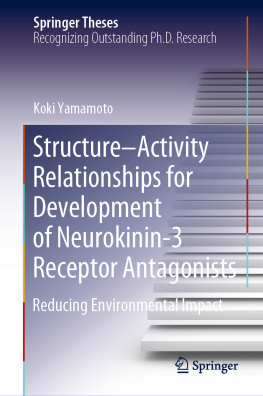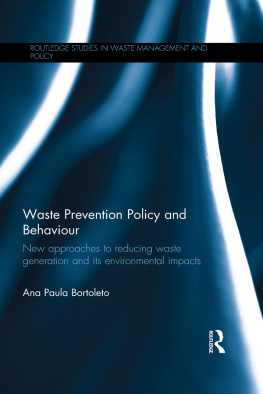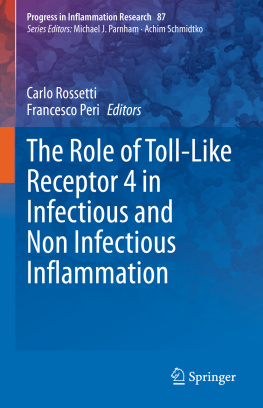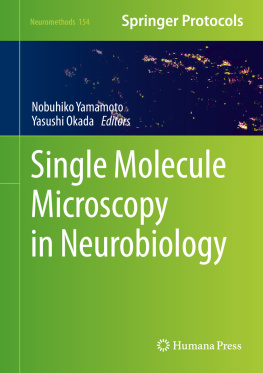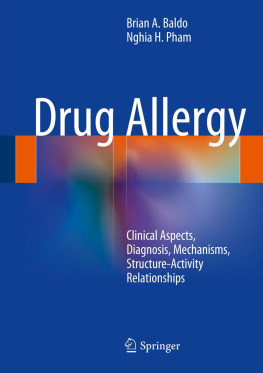Springer Theses Recognizing Outstanding Ph.D. Research
Aims and Scope
The series Springer Theses brings together a selection of the very best Ph.D. theses from around the world and across the physical sciences. Nominated and endorsed by two recognized specialists, each published volume has been selected for its scientific excellence and the high impact of its contents for the pertinent field of research. For greater accessibility to non-specialists, the published versions include an extended introduction, as well as a foreword by the students supervisor explaining the special relevance of the work for the field. As a whole, the series will provide a valuable resource both for newcomers to the research fields described, and for other scientists seeking detailed background information on special questions. Finally, it provides an accredited documentation of the valuable contributions made by todays younger generation of scientists.
Theses are accepted into the series by invited nomination only and must fulfill all of the following criteriaThey must be written in good English.
The topic should fall within the confines of Chemistry, Physics, Earth Sciences, Engineering and related interdisciplinary fields such as Materials, Nanoscience, Chemical Engineering, Complex Systems and Biophysics.
The work reported in the thesis must represent a significant scientific advance.
If the thesis includes previously published material, permission to reproduce this must be gained from the respective copyright holder.
They must have been examined and passed during the 12 months prior to nomination.
Each thesis should include a foreword by the supervisor outlining the significance of its content.
The theses should have a clearly defined structure including an introduction accessible to scientists not expert in that particular field.
More information about this series at http://www.springer.com/series/8790
Koki Yamamoto
StructureActivity Relationships for Development of Neurokinin-3 Receptor Antagonists
Reducing Environmental Impact
Doctoral Thesis accepted by Kyoto University, Kyoto, Japan
Dr. Koki Yamamoto
Graduate School of Pharmaceutical Sciences, Kyoto University, Kyoto, Japan
ISSN 2190-5053 e-ISSN 2190-5061
Springer Theses
ISBN 978-981-15-2964-1 e-ISBN 978-981-15-2965-8
https://doi.org/10.1007/978-981-15-2965-8
Springer Nature Singapore Pte Ltd. 2020
This work is subject to copyright. All rights are reserved by the Publisher, whether the whole or part of the material is concerned, specifically the rights of translation, reprinting, reuse of illustrations, recitation, broadcasting, reproduction on microfilms or in any other physical way, and transmission or information storage and retrieval, electronic adaptation, computer software, or by similar or dissimilar methodology now known or hereafter developed.
The use of general descriptive names, registered names, trademarks, service marks, etc. in this publication does not imply, even in the absence of a specific statement, that such names are exempt from the relevant protective laws and regulations and therefore free for general use.
The publisher, the authors and the editors are safe to assume that the advice and information in this book are believed to be true and accurate at the date of publication. Neither the publisher nor the authors or the editors give a warranty, expressed or implied, with respect to the material contained herein or for any errors or omissions that may have been made. The publisher remains neutral with regard to jurisdictional claims in published maps and institutional affiliations.
This Springer imprint is published by the registered company Springer Nature Singapore Pte Ltd.
The registered company address is: 152 Beach Road, #21-01/04 Gateway East, Singapore 189721, Singapore
Supervisors Foreword
It is my great pleasure to introduce Dr. Koki Yamamotos thesis for Springer Theses. He joined our group at Kyoto University in April 2013 and started his scientific career under the supervision of Prof. Nobutaka Fujii, Prof. Hiroaki Ohno, and myself. During his six-year career at Kyoto University, he performed several structureactivity relationship studies of receptor ligands for neurokinin-3 receptor (NK3R), which regulates reproductive neuroendocrine systems.
His initial project as an undergraduate student focused on the development of novel NK3R antagonist peptides with resistance against proteolytic degradation. He learned a series of technical skills for medicinal chemistry, including solid-phase peptide synthesis and bioassays. In his doctoral studies at the Graduate School of Pharmaceutical Sciences, Kyoto University from 2014, he engaged in the development of selective NK3R antagonists with reduced environmental impact, which could be converted into substance(s) with much lower activity after excretion from the target animal(s). His unique concern was derived from research experience at the Animal Resource Science Center, Graduate School of Agricultural and Life Science, The University of Tokyo, in collaboration with Prof. Kei-ichiro Maeda (The University of Tokyo) and his colleagues in the snow season of 2014. He realized that large portions of bioactive agents were excreted from the target animal(s) and could be released into the natural environment without being metabolized or degraded. To minimize the effect of the bioactive ingredient(s) on non-target animals, he designed novel NK3R antagonists with decreased bioactivity under environmental conditions. During the course of his studies, he also investigated the synthesis of unprecedented heterocycles, which could be employed as scaffolds for novel NK3R antagonists. It should be noted that his scientific contributions included many collaborative works with Prof. Maeda, Prof. Hiroko Tsukamura (Nagoya University), Prof. Satoshi Ohkura (Nagoya University), and their colleagues, in which the in vivo bioactivities of several agents for reproductive functions were investigated.
This comprehensive thesis includes a design concept, chemistry, biological evaluations, and chemical properties, which will be informative for the development of novel NK3R antagonists and for the design of pharmaceutical agents with reduced environmental impact. He has published three articles related to this thesis in medicinal chemistry journals. I very much appreciate his continuous efforts to achieve the project goals.
Prof. Shinya Oishi
Kyoto, Japan
November 2019
Acknowledgements
The author would also like to express his sincere appreciation to Prof. Hiroaki Ohno, Prof. Nobutaka Fujii, Dr. Shinya Oishi, and Dr. Shinsuke Inuki (Kyoto University) for their kind guidance, helpful advice, and encouragement throughout this study.
The author is profoundly grateful to Dr. Akira Hirasawa, Dr. Toru Nakatsu (Kyoto University), Prof. Kei-ichiro Maeda, Dr. Fuko Matsuda (The University of Tokyo), Prof. Hiroko Tsukamura, Prof. Satoshi Ohkura (Nagoya University), and Dr. Masahito Ohue, Dr. Yasushi Yoshikawa (Tokyo Institute of Technology) for their professional guidance as well as technical supports to accomplish this research.

